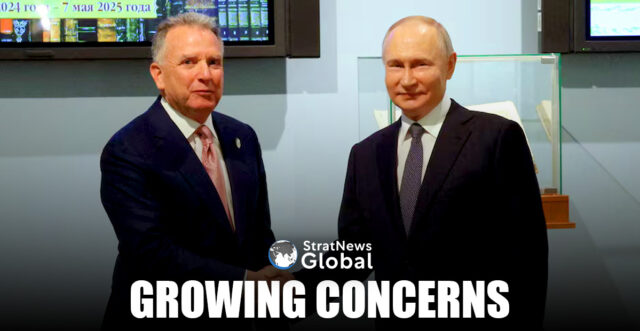Steve Witkoff, the U.S. special envoy leading talks with Russia, met with President Trump shortly after dining with a Russian negotiator in Washington. Witkoff told Trump that the quickest way to achieve a ceasefire in Ukraine would be to back a plan allowing Russia to take control of four eastern Ukrainian regions it illegally tried to annex in 2022, according to multiple sources.
Witkoff had previously advocated for giving Russia control of four Ukrainian regions, including in a podcast with Tucker Carlson — a stance Ukraine firmly rejects, and some U.S. and European officials view as a Russian overreach.
In a meeting with Trump, General Keith Kellogg, POTUS’ Ukraine envoy, opposed Witkoff’s position, stressing that Ukraine might negotiate on disputed land but would never fully surrender those territories to Russia.
The meeting ended without Trump making a decision to change the U.S. strategy. Witkoff traveled to Russia Friday to meet Putin.
Trump administration officials are divided over how to resolve the Ukraine-Russia conflict, with envoy Steve Witkoff and General Keith Kellogg taking opposing approaches—Witkoff favoring concessions to Russia, and Kellogg supporting stronger backing for Ukraine. Key agencies and involved parties declined to comment on the matter.
Breaking Protocols
Steve Witkoff initially invited Russian envoy Kirill Dmitriev—who is under U.S. sanctions—to his home for dinner, breaking standard security protocol and raising concerns within the White House and State Department.
Due to the risks, the dinner was moved to the White House.
Witkoff, a longtime friend of Trump and key diplomatic player, has gained support from Ukraine-skeptic Republicans but sparked backlash from others who fear the administration is leaning too pro-Russia.
His comments in the Carlson interview prompted some Republicans to call National Security Adviser Mike Waltz and Secretary of State Marco Rubio with concerns.
Since taking office in January, Trump has shifted U.S. foreign policy by pushing Ukraine toward a ceasefire and rolling back many of Biden’s measures against Russia.
Inexperienced
Some U.S. and European officials are concerned that Russia is exploiting Witkoff’s inexperience in negotiations as he carries out Trump’s Ukraine strategy, according to multiple sources familiar with internal discussions.
“Witkoff must go, and Rubio must take his place,” read a March 26 letter from Eric Levine, a major Republican donor. The letter, sent to a group including Republican donors and seen by Reuters, was written after the Carlson interview and a Fox News appearance, and criticized Witkoff for praising Putin.
Trump has repeatedly said that he wants to broker a ceasefire in Ukraine by May, arguing the U.S. must end a conflict that has killed hundreds of thousands and risks a direct confrontation between the U.S. and nuclear-armed Russia.
But two partial ceasefire deals – one on energy infrastructure and one in the Black Sea – have stalled and the president has become frustrated over the lack of progress.
Witkoff’s Growing Role
Witkoff plays a central – and expanding – role in the Trump administration’s foreign policy. Even before Trump took office, Witkoff had helped secure a long-sought Gaza ceasefire – which has since unraveled – and later negotiated the return of a U.S. citizen, Marc Fogel, from Russia.
He traveled to Russia to meet with Putin and is set to visit the Middle East for talks with Iran, taking on a major national security role. He first publicly proposed giving Russia control of Luhansk, Donetsk, Zaporizhzhia, and Kherson during a March 21 interview with Carlson.
“They’re Russian-speaking,” he said of the eastern territories. “There have been referendums where the overwhelming majority of the people have indicated that they want to be under Russian rule.”
Witkoff’s comments shocked many U.S. national security officials – the special envoy’s rhetoric mirrored that of Russian officials. Western governments have called the hastily organized referendum votes a sham and pledged not to recognize their results.
Just a few days after the Carlson interview, the Wall Street Journal, owned by Rupert Murdoch’s News Corp, published an op-ed titled “Steve Witkoff Takes the Kremlin’s Side”.
Democrats have weighed in, too.
“Witkoff and Trump have committed a cardinal sin of diplomacy: they have put their desperation for a deal on full display,” said Ned Price, a former spokesperson for the State Department under President Joe Biden.
Witkoff has supporters within the administration who argue he’s been unfairly criticized by hawkish foreign policy officials, as the Republican Party shifts away from foreign intervention. He also continues to have a close personal relationship with Trump.
“Special Envoy Witkoff has brought a wealth of private sector negotiating experience and urgency to the diplomatic stage and we’re already seeing results in just a few weeks,” National Security Adviser Mike Waltz told the Hill in a statement.
No Clear Strategy
European officials are concerned that the U.S. lacks a clear strategy to end the war in Ukraine, and fear pressure for quick results could lead to compromises that undermine both Ukraine and Europe’s security. After recent talks with the U.S. administration, they felt uncertain about America’s goals and direction in the negotiations.
Despite regular discussions between Witkoff and Kellogg, the U.S. administration has not established a coordinated policy on Ukraine. The National Security Council has held only one principals’ meeting on the issue, causing confusion both within the administration and among European allies. Two senior Western diplomats expressed concerns that Washington lacks a clear plan for progressing the peace talks or handling Russia’s delays.
“We sometimes hear contradictory things from different parts of the administration,” one of the diplomats, speaking on the condition of anonymity, said. “That also adds to the sense that there is no real plan here.”
(With inputs from Reuters)





